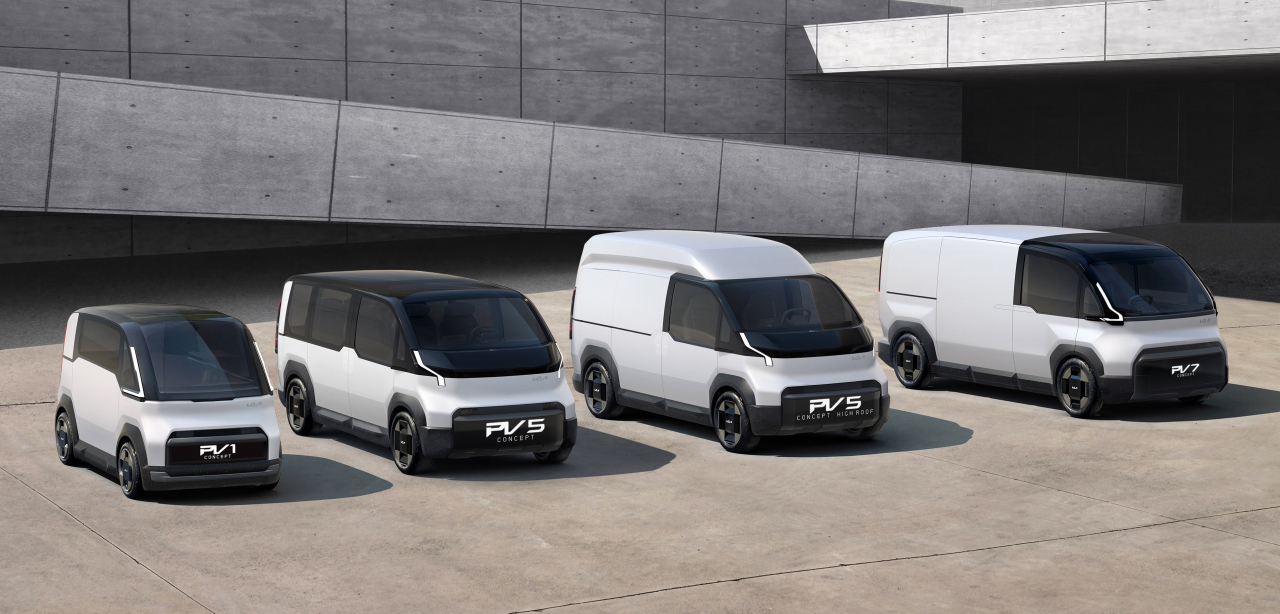[CES 2024] Kia debuts purpose-built concept EVs with modular design
By Moon Joon-hyunPublished : Jan. 9, 2024 - 15:54

LAS VEGAS -- Kia on Monday unveiled a versatile lineup of concept purpose-built electric vehicles at the CES 2024, featuring an all-new modular design architecture, and targeting commercial applications with a focus on sustainability and a blend of hardware and software solutions.
The lineup is set for commercialization in 2028.
“We are targeting the under-electrified light commercial vehicle market, identifying an opportunity to innovate in a sector burdened by inefficient post-production retrofitting processes,” said Kia CEO Song Ho-sung during the media conference.
The strategy's flagship model is the Kia Concept PV5. Designed to be adaptable, the PV5 can function in various roles, such as a taxi, delivery van, or personal recreational vehicle. Its modularity is enabled by “Easy Swap” technology, which allows the vehicle's chassis to support different “life modules” for varied uses. This adaptability is enabled by a “Dynamic Hybrid” body structure, offering adjustable lengths for different purposes without compromising vehicle strength.
Kia's purpose-built vehicle strategy unfolds in three phases. Initially, the focus is on vehicles like the PV5, optimized for sectors including ride-hailing and delivery services. These vehicles will also have enhanced connectivity, allowing them to operate efficiently as part of a fleet.
The second phase expands the lineup with models like the PV7 and PV1, introducing AI-driven mobility platforms. These platforms will use data analytics to interact with users and stay updated. In the final phase, Kia envisions its PBVs as fully integrated into a future mobility ecosystem, functioning as customizable platforms within smart city infrastructures.
Sustainability is a cornerstone of Kia's PBV design. The vehicles will incorporate materials like bioplastics and recycled fabrics, aligning with environmental conservation goals while offering a unique aesthetic. The design language of these vehicles is rooted in simplicity and functionality, prioritizing user-friendly features over decorative elements.
Kia's strategy goes beyond vehicle design, encompassing a comprehensive business system. This includes a new dedicated factory in Autoland Hwaseong, Gyeonggi Province, set to open in 2025 with a production capacity of 150,000 units annually. The factory will adopt a hybrid production method, combining conventional and cell-based manufacturing processes.
“By 2030, the global market for light commercial vehicles is expected to hit 3.5 million units, with 1.5 million being electric, and Kia targets 300,000 of these,” said CEO Song.
Kia is also enhancing its in-vehicle infotainment, fleet management systems and EV charging solutions with the software-defined vehicle system that Hyundai Motor Group announced earlier on Monday. These systems will leverage AI and data analytics to provide predictive maintenance, efficient routing and tailored charging schedules.
In autonomous driving, Kia, in collaboration with Motional, plans to develop and operate a robotaxi service by 2028 with its PBVs, leveraging advanced Level 4 autonomous driving technology.
“Kia will stand out in the B2B light commercial market, moving beyond the typical approach of simply converting existing vehicles to electric with the bold modular approach. Our commitment is to continuously refine the user experience through software updates and specialized apps,” said Kim Sang-dae, head of the company's strategic business planning division.
The anticipated cost for the PV5 model for business customers is around $35,000.




















